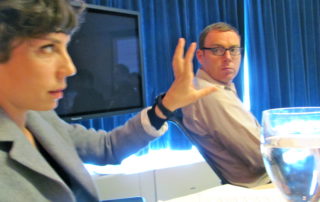Understanding roles and responsibilities.
You probably understand what your functional roles are (MD, FD, etc) but what about your leadership roles. The tasks of leadership don’t always fall neatly into functional categories. What if one of you is red hot at strategic planning. Isn’t it better for that person to do the planning than to say it falls into a particular functional area? Working out who does what and how you support each other can be incredibly helpful, especially in a growing organisation, where you may all have just mucked in up to now. Sometimes it’s useful to work out whether you actually are a team or just a group of colleagues.
Talk to me today about clarifying roles and responsibilities.


Senior team coaching.
The SLT should be the powerhouse that drives the organisation. All too often, it’s a group of people who happen to have the same boss, focused mostly on their bits of the organisation. The aim of senior team coaching is to create a joined-up team, working together towards common goals. Typical areas of discussion include identifying complementary strengths, handling conflict effectively, making collective decisions and working out the limits of your individual autonomy.
Talk to me today about senior team coaching.
Team mergers.
When you merge teams, people come with different cultural norms, ways of working and expectations. There may be resentment, based on which team is seen to have the upper hand. Team coaching is a constructive way of exploring a new team identity, creating something that’s greater than the sum of the parts.
Talk to me today about support for team mergers.



Remote teams.
In the post-Covid world, working with colleagues we rarely see is something we’re all getting used to. Even with the phased return to the workplace, some people will be working from home some or all of the time. The absence of ‘water cooler moments’ means you need to be more deliberate in how you keep in touch. Team coaching can provide an opportunity to review the way you work. How do you support each other? How do you stay in touch? How can you keep up to date with the rest of the organisation? How can you ensure you respect each other’s boundaries? There are no right answers to these questions. Each team needs to work them out for themselves. It’s useful to have a structured forum to do so.
Talk to me today about support for remote teams.
Succession planning.
You may think of succession planning as being a leadership development issue, rather than team working issue, and to some extent it is. But in my experience, the biggest mistake companies make in succession planning is to prepare the next generation to take over without preparing the existing leader to let go. This is particularly the case situations where the current leader will be staying on some capacity, such as chairman (a very common scenario in family businesses). Looking at how and when decision making responsibility, control and key relationships will be handed over can mean the difference between a smooth handover and a resentful muddle.
Talk to me today about succession planning.


“Caroline helped us to work through some really difficult issues in the senior management team caused by differences in personality and priorities. She did so with sensitivity and positivity but didn’t shy away from challenging issues. We have got a better understanding of each other as a result and are working together more effectively”
“The bespoke workshops Caroline ran for us made us really think about our interaction with clients and how to work more collaboratively to bring about a lasting solution for them. Caroline introduced models and theory which got the team thinking and talking about how we work as a team and how to best support our clients.“
“Succession planning is critical in a family business. Caroline was very important in preparing my son and daughter as they took over the business. She has helped us to better understand the dynamics between us as a family and between the family and non-family directors.”

Why is teamwork so hard? How to develop better team working
Having worked out what is and isn't a team last month, this month I'm looking at why so many teams fail to work well together and what you can do to develop better team working. The insecure leader One of the first reasons teams fail is not recognising that they are - or should be - a team in the ...
Related Articles
 What is a team? It’s not as straightforward as you think - Does that sound like a daft question? Surely everyone knows what a team is. But actually, it's not as straightforward as you might think. For example, a group of people working for the same boss is not necessarily team, no matter how much the manager talks about "my team". A team is a group of people working towards a shared… ...
What is a team? It’s not as straightforward as you think - Does that sound like a daft question? Surely everyone knows what a team is. But actually, it's not as straightforward as you might think. For example, a group of people working for the same boss is not necessarily team, no matter how much the manager talks about "my team". A team is a group of people working towards a shared… ... Five strategies for avoiding conflict and why you should ditch them all - What do you think of when you hear the word 'conflict'? I think for a lot of us, conflict conjures up a particularly bad Eastenders' Christmas - raised voices, harsh words, fists flying, someone trying to calm things down by saying "Leave it Barry, he ain't worth it". In fact, many of us are so afraid of this kind of conflict… ...
Five strategies for avoiding conflict and why you should ditch them all - What do you think of when you hear the word 'conflict'? I think for a lot of us, conflict conjures up a particularly bad Eastenders' Christmas - raised voices, harsh words, fists flying, someone trying to calm things down by saying "Leave it Barry, he ain't worth it". In fact, many of us are so afraid of this kind of conflict… ...Why do so few businesses have a decent strategy?
In my 25 years as a business psychologist, I've worked with a lot of businesses, particularly mid-sized companies, and it's surprising just how few of them have a decent strategy. By 'a decent strategy' I mean that the business knows where it's going and how it's going to get there. "We want to double in size in the next five ...
Get in Touch
To find out more about how I can help you, use the form below to send a message and I’ll get back to you as soon as I can.





